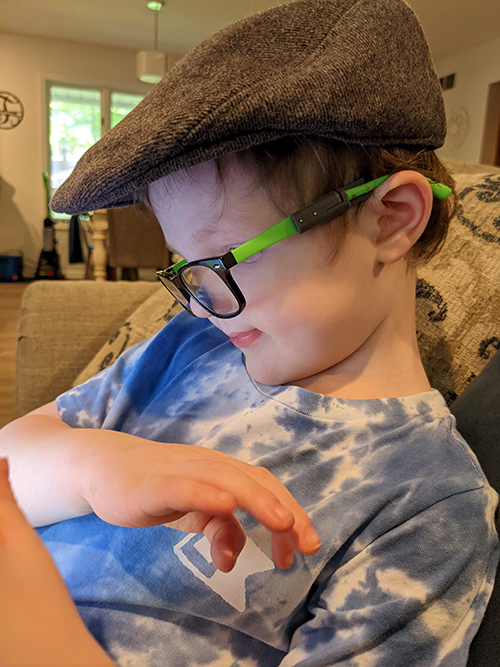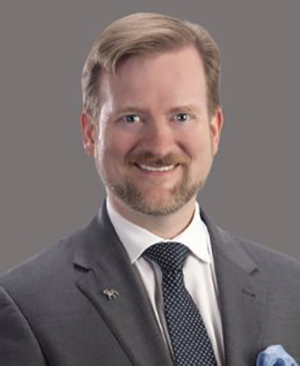
Britt Taylor, son of Ferris’ interim dean of the Michigan College of Optometry Daniel
Taylor, shows off Protoconch, a recently patented device intended to support use of
eyeglasses and cochlear implants for children who have these specific needs.
Collaboration between a Ferris State University researcher, campus departments and the state of Michigan has inventor Dr. Daniel Taylor’s Protoconch ™ adaptor now bearing a United States patent, only the third in the university’s history as sole assignee. This achievement represents a significant step toward the device’s commercialization, meant to benefit young people with visual and hearing issues.
Taylor, the newly-named dean of the Michigan College of Optometry at Ferris State University, began his research in Fall 2018 and gained technical support from Ferris' Product Design Engineering Technology program in developing the Protoconch. In particular, alumna Jaclyn Vander Ploeg did formative work on the prototype in her senior project, and shares recognition with Taylor in the patent language as an inventor.
The device connects the processor of the cochlear implant to the eyeglass frame. Taylor said advancing this project required funding from the state of Michigan.
“We have received grants from the Michigan Economic Development Corporation’s (MEDC) ADVANCE Early Stage Proof of Concept Fund, which has been crucial to our work,” Taylor said. “We hope for another granting cycle’s support from the available contributors so the Protoconch can move toward commercialization.”
Funding includes Ferris financial support through previous appropriations from the Vision Research Institute.
Taylor’s son, Britt, struggled with the proximity of a cochlear implant and the frame of his glasses. The researcher said the Protoconch is unique in its design regarding products seeking to offer similar patient benefits.
“From 2020 to 2022, we developed design improvements for our prototype to bring about a very workable physical device,” Taylor said. “The other designs of similar implements we are aware of provide only a portion of the benefits we expect from the Protoconch. Our device should allow those requiring glasses and cochlear implants to wear them both together, with comfort, usability and security.”
Thomas Dowling, with Ferris’ Office of Research and Sponsored Programs, said the Tech Transfer Talent Network (T3N), a statewide university collaborative, has offered consultancy on this project in concert with the MEDC funding for the research.
“Our T3N Mentor-in-Residence Karen Studer-Rabeler has been a critical component of this research work, as we rely on her experience as an entrepreneur and advisor,” Dowling said. “She has been invaluable in assistance to all aspects of the Protoconch’s development process.”
Studer-Rabeler said the announcement Tuesday, Feb. 28, of Ferris gaining a patent for the Protoconch, was Taylor’s reward for investing his passion and desire into the project.
‘Daniel’s passion for helping many children, including his son, should support youngsters with simultaneous hearing and visual assistance needs during a crucial part of their development process,” Studer-Rabeler said. “Dr. Taylor recognized the point of struggle and stayed focused on the best way to alleviate it. I have been impressed by how he has worked to gain a real understanding of the marketplace and explored options to use this technology best broadly. This, along with the patent, will guide the next steps in achieving the goal of having Protoconch as a commercially viable product.”
Dowling, who is director of Ferris’ Office of Research and Sponsored Programs, said Taylor’s patent is only the second to be issued since technology transfer was established at Ferris in 2016 and is the third to receive significant support from MEDC.
“The state has significant resources to support faculty inventors and technology transfer, and we have benefitted from these resources,” Dowling said. “Dr. Eric Nybo received an ADVANCE grant sponsored by the MEDC that led to a patent issue, with follow-on funding from the National Science Foundation. Sonali Kurup, also from the College of Pharmacy, is in the patent review process for her work on ‘Inhibitors For Multi-Resistant Cancers.’ Kurup’s work was also aided by an ADVANCE Proof-of-Concept award and a MI KickStarter grant sponsored by the MEDC. Kurup also participated in the NSF I-Corps program, fastPACE, offered at the University of Michigan.”

Dr. Daniel Taylor
Provost and Vice President for Academic Affairs Bobby Fleischman said the Office of Research and Sponsored Programs and the university can be proud of Taylor’s efforts and accomplishment.
“Dean Taylor’s work on this patent demonstrates his unique ability to bring innovative thoughts to fruition while addressing a critical societal need through cutting-edge, interdisciplinary technology,’” Fleischman said.” As an administrator and clinician who continues to solve problems in the profession, Dr. Taylor’s work brings great distinction to Ferris State University and the Michigan College of Optometry.”
Dowling said innovative scholarly efforts continue with the support of Office of Research and Sponsored Programs staff and leadership.
“These recently received patents bolster the promotion of innovation and emphasize the ideas of our faculty,” Dowling said. “Acquiring a U.S. patent is major focus at larger institutions, but we have created the infrastructure to participate in, and succeed with advancing these ideas. Word of mouth about our faculty’s successes and initiative shown by these researchers will only help spur greater study as we go forward.”
Dowling said state and federal funding is welcome and crucial to the opportunities for research previously done and those projects Ferris’ specialists are considering.
“Administrative support for the expanded study in our science-focused colleges and the Shimadzu Core Laboratory for Academic and Research Excellence will be another necessary component of growth in scholarly exploration and further successes in such processes,” Dowling said.

